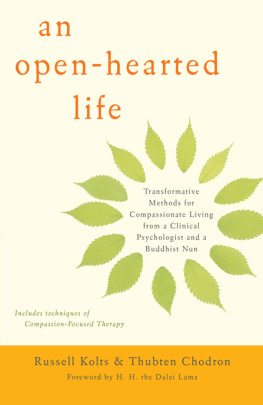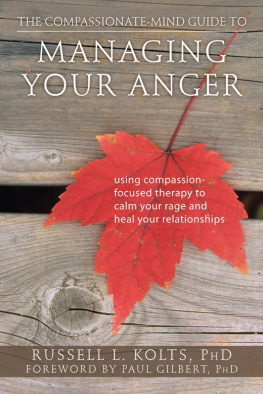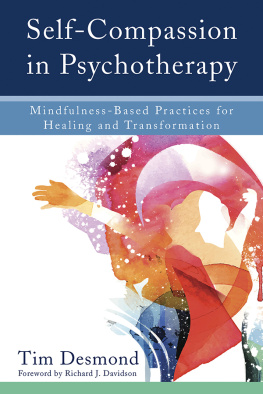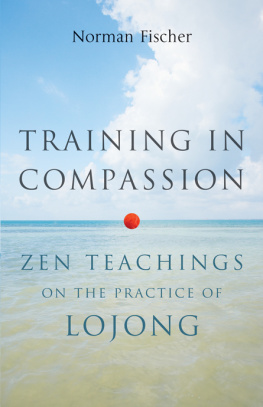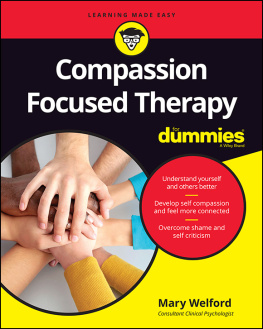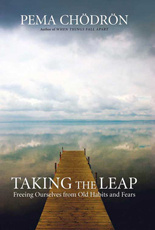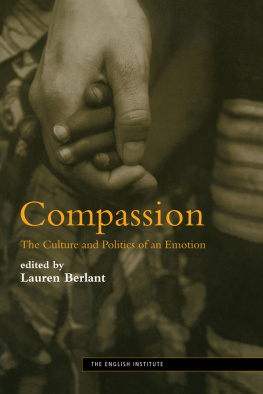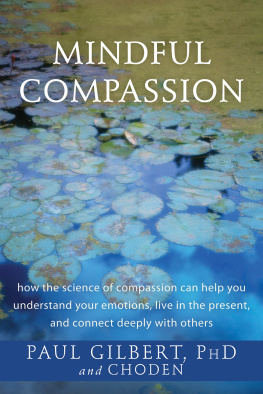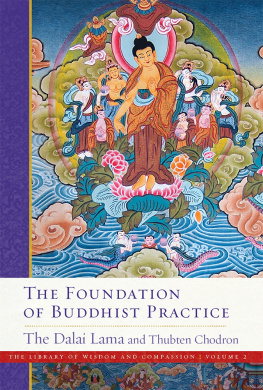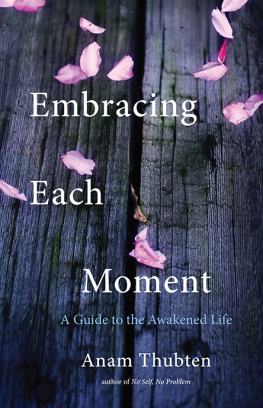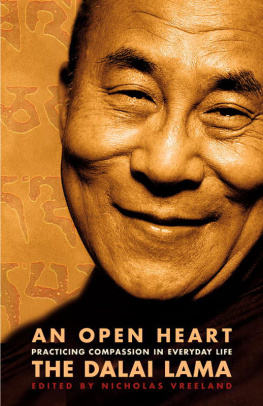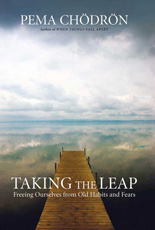This book is a gift. It will quietly lift you up, touching our deepest desire that all beings, including ourselves, be happy and free from suffering. With beautifully clear language and examples, the authors show how to make compassion an easy and central part of our lives. Allow this book to work on you, reading it slowly and gently practicing what you learn. It will heal your heart.
Christopher Germer, PhD, author of The Mindful Path to Self-Compassion and clinical instructor at Harvard Medical School
The human and planetary situation today cries out for sturdy, clear-eyed compassion that motivates actions of real benefit to others and ourselves. Toward that end, An Open-Hearted Life offers a powerful synergy of wisdom and practical instruction drawn from Russell Koltss deep experience with Compassion-Focused Therapy and from Ven. Thubten Chodrons lifetime committed to Tibetan Buddhist practice.
Sharon Salzberg, author of Real Happiness and Lovingkindness
This important and highly accessible book on compassion is a powerful and comprehensive contribution to what it means to have a heart that is kind and that can meet the world with strength and wisdom.
Roshi Joan Halifax, author of Being with Dying
A collection of reflections on the practice of compassion in everyday life that provides a recipe for a deeper life and a better world. It is written with minds and hearts wide open.
Daniel Gilbert, PhD, author of Stumbling on Happiness and professor of psychology at Harvard University
An Open-Hearted Life shows us how to live a more meaningful, connected and a compassionate life. Bringing Buddhist teachings in a partnership with the techniques and insights of contemporary psychotherapy, the authors offer valuable guidelines to living a life with a truly open heart.
Thupten Jinpa, PhD, principal English translator to the Dalai Lama and author of Essential Mind Training
A uniquely creative useful guide to improving your life.
Paul Ekman, PhD, coauthor (with the Dalai Lama) of Emotional Awareness
This wonderful book is easy and enjoyable to read, consisting of deep insights into the meaning of compassion and straightforward practices designed to help cultivate an open heart.
Kristin Neff, PhD, Professor of Educational Psychology, University of Texas at Austin
ABOUT THE BOOK
A life overflowing with compassion. It sounds wonderful in theory, but how do you do it? This guide provides practical methods for living with this wonderful quality, based on traditional Buddhist teachings and on methods from modern psychologyparticularly a technique called Compassion-Focused Therapy (CFT). The methods presented by the two authorsa psychotherapist and a Tibetan Buddhist nunturn out to have a good deal in common. In fact, they complement each other in wonderful ways. Each of the sixty-four short chapters ends with a reflection or exercise for putting compassion into practice in various life situations.
RUSSELL KOLTS, PhD, is a licensed clinical psychologist and professor at Eastern Washington University outside of Spokane, Washington. He is the author of The Compassionate Mind: Guide to Managing Your Anger.
Sign up to receive news and special offers from Shambhala Publications.

Or visit us online to sign up at shambhala.com/eshambhala.
An Open-Hearted Life
Transformative Methods for Compassionate Living from a Clinical Psychologist and a Buddhist Nun

Russell Kolts & Thubten Chodron

SHAMBHALA
Boston
2015
SHAMBHALA PUBLICATIONS, INC.
Horticultural Hall
300 Massachusetts Avenue
Boston, Massachusetts 02115
www.shambhala.com
2013 by Russell Kolts and Thubten Chodron This editon first published in the UK by Robinson, an imprint of Constable & Robinson Ltd, 2013.
Cover design by Kathleen Lynch/Black Kat Design. Cover photograph by plainpicture/amanaimages
All rights reserved. No part of this book may be reproduced in any form or by any means, electronic or mechanical, including photocopying, recording, or by any information storage and retrieval system, without permission in writing from the publisher.
LIBRARY OF CONGRESS CATALOGING-IN-PUBLICATION DATA
Kolts, Russell L., author.
[Living with an open heart]
An open-hearted life: transformative methods
for compassionate living from a clinical
psychologist and a Buddhist nun / Russell Kolts and Thubten Chodron.
pages cm
Previously published: London: Constable & Robinson Ltd.,
2013, under the title Living with an open heart.
eISBN 978-0-8348-0047-2
ISBN 978-1-61180-211-5 (paperback)
1. Spiritual lifeBuddhism. 2. PsychotherapyReligious aspectsBuddhism. 3. CompassionReligious aspectsBuddhism.
I. Thubten Chodron, 1950, author. II. Title.
BQ5612.K65 2015
177.7dc23
2014024858
This book is dedicated to
His Holiness the14th Dalai Lama of Tibet.
And to all sentient beings,
who wish only to be happy and to not suffer.
For as long as space endures,
And for as long as sentient beings remain,
Until then may I too abide
To dispel the misery of the world.
Contents
Western psychology has focused on the scientific study of mind and, to a large extent, the individual. It has concentrated on mental health problems, aggression, assertiveness, self-esteem, how to compete better in the world, how to have better bodies and better sex. In fact, there is increasing evidence that over the last thirty years we have become more self-focused, grasping and narcissistic, increasingly preoccupied with our sense of self and our self-presentations, whether in the real world of work or dating, or via social media. We have, as the late Christopher Lasch noted, been turned into theatrical performers riddled with self-criticism and shame, fearful of rejection if our performance does not win the approval of others. Unfortunately, the consequence of our material wealth and do more, have more, be more attitudes is not always greater happiness, but increased risk of depression and anxiety, which are increasing in Western society, especially among younger cohorts.
So what happens when we turn this on its head, so that it is not so much self-enhancement that is the key to happiness but compassion, the wish to be open to the suffering of self and others with a commitment to try to engage with it, alleviate and prevent it? What happens when we see the suffering in ourselves and others not as something that has gone wrong, or an indication of personal failure or weakness, but rather as a normal process of living that requires us to develop insight and courage?
This was the journey of the Buddha twenty-five centuries ago. He was born a prince, and to protect him from the suffering of life his father built him high-walled golden palaces where all his desires could be satisfiedthe best food, wine and ladies. So for the first thirty years or so he was able to simply live a life of the fulfilment of worldly pleasures. In a way, of course, this is what Western society today tells us we should be doingto buy more, have more, do more, be moreto indulge ourselves in the pleasures of food, drink, holidays, cars and TV shows, and not to notice too much the suffering in our own hearts or in those around us.
Next page
